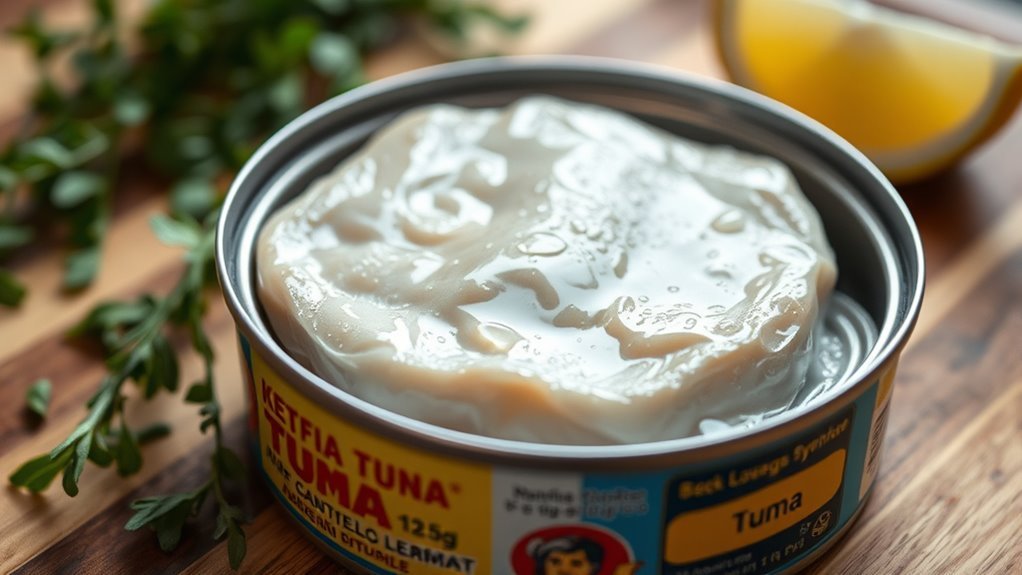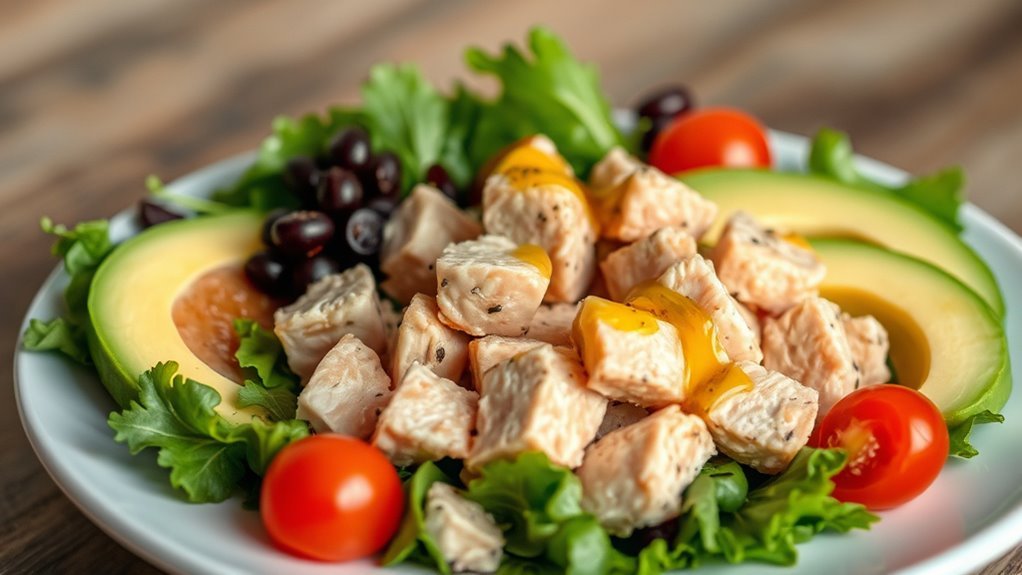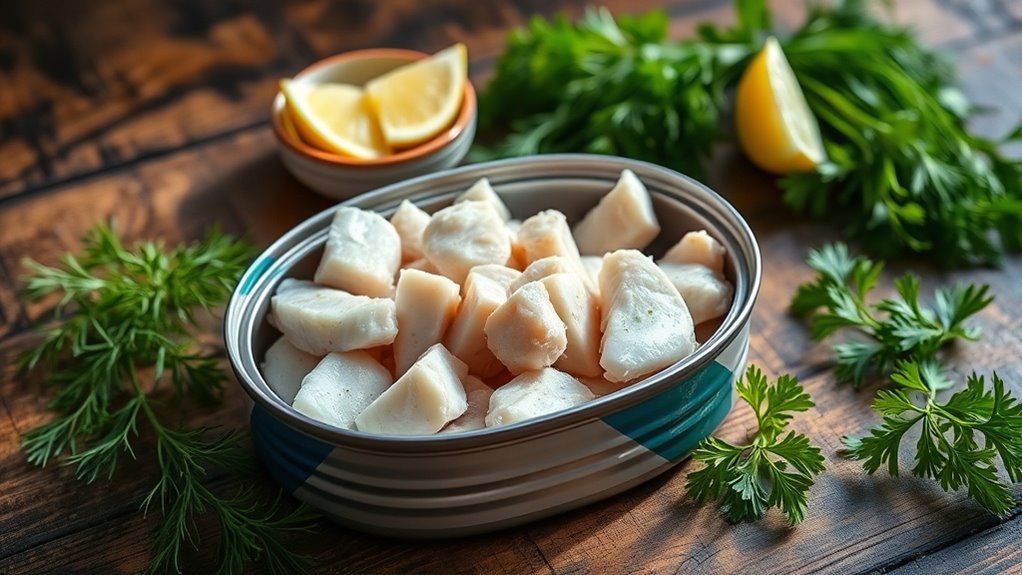Canned tuna is an excellent choice for your keto diet. It’s high in protein, providing around 20-25 grams per 3-ounce serving, and contains very low carbohydrates, usually 0-1 gram. Plus, with its healthy fats, particularly omega-3s, it supports heart health and helps maintain ketosis. You can easily incorporate it into salads, casseroles, or wraps. If you want to explore more about its benefits and how to use it, there’s plenty more to discover.
Understanding the Keto Diet

When it comes to understanding the keto diet, it is vital to grasp its fundamental principles. At its core, the keto diet emphasizes a high-fat, low-carbohydrate intake, encouraging your body to enter a state of ketosis. In ketosis, your body burns fat for energy instead of carbohydrates. This shift can lead to weight loss and improved mental clarity for many. However, it’s essential to recognize the dietary restrictions involved; you’ll need to limit foods high in sugar and starches. Embracing these keto principles can feel liberating, as you learn to enjoy healthy fats, proteins, and low-carb vegetables. Ultimately, understanding these concepts will empower you to make informed dietary choices while enjoying the benefits of the keto lifestyle. Additionally, achieving metabolic adaptation enhances your body’s efficiency in utilizing fat for energy.
Nutritional Profile of Canned Tuna

When considering canned tuna, it’s important to look at its nutritional profile, particularly its protein, fat, and carbohydrate content. You’ll find that canned tuna is high in protein, making it an excellent choice for those on a keto diet. Additionally, its low carbohydrate content and healthy fats contribute to its overall appeal as a nutritious option. Furthermore, canned tuna can be combined with healthy fats like mayonnaise to enhance flavor and maintain a low-carb, high-fat meal.
Protein Content Overview
Canned tuna is an excellent source of protein, boasting around 20 to 25 grams per 3-ounce serving, depending on the variety. This makes it one of the top protein sources for those seeking to maintain or build muscle while following a keto diet. The protein quality in canned tuna is high, as it contains all essential amino acids your body needs for peak function. Including tuna in your meals can help you meet your daily protein requirements without excessive calories. Plus, it’s convenient and versatile, fitting easily into salads, wraps, or casseroles. For anyone looking to enhance their diet with quality protein, canned tuna is a smart choice. Enjoy its benefits while embracing your dietary freedom! Additionally, canned tuna pairs well with low-carb vegetables, making it an ideal option for balanced keto meals.
Fat Composition Analysis
Although many people think of protein when considering canned tuna, its fat composition is equally important, especially for those following a keto diet. Canned tuna typically contains a mix of healthy fats, primarily polyunsaturated fatty acids, including omega-3 and omega-6. These omega benefits are vital for maintaining heart health and reducing inflammation, aligning well with keto principles. A standard serving can provide around 1-2 grams of fat, with a significant portion coming from omega-3s, which support brain function and overall well-being. Additionally, the low carbohydrate content allows you to enjoy this protein-rich food without compromising your keto goals. So, if you’re seeking a convenient and nutritious option, canned tuna is a great choice for your diet.
Carbohydrates Present Assessment
A standard serving of canned tuna typically contains negligible carbohydrates, usually around 0-1 gram per serving, making it an excellent fit for those on a keto diet. This low carb content aligns well with the nutritional goals of a keto lifestyle, allowing you to focus on higher protein and fat intake without worrying about exceeding your carb limit. Additionally, incorporating canned tuna into your meals can help you achieve an efficient energy source as it is high in protein and low in fat.
| Serving Size | Carbohydrates (g) | Nutritional Content |
|---|---|---|
| 3 oz (85 g) | 0-1 | High in protein, low in fat |
| 5 oz (140 g) | 0-1 | Rich in omega-3 fatty acids |
| 7 oz (198 g) | 0-1 | Packed with vitamins |
| 10 oz (280 g) | 0-1 | Excellent for muscle health |
Choosing canned tuna is a simple way to maintain a balanced keto diet.
Benefits of Canned Tuna on a Keto Diet

When it comes to maintaining a keto diet, incorporating canned tuna can be a smart choice. This convenient option offers numerous keto benefits that can help you stay on track while enjoying flavorful meals.
- High in protein: Canned tuna provides a substantial protein boost to support muscle maintenance.
- Low in carbs: It’s an excellent choice for keeping carbohydrate intake minimal.
- Rich in omega-3s: These healthy fats promote heart health and reduce inflammation.
- Nutrient-dense: Canned tuna is packed with vitamins and minerals, enhancing your overall nutrition.
- Versatile: You can easily add it to salads, wraps, or casseroles for a quick meal.
Types of Canned Tuna: Which Is Best?
Which type of canned tuna should you choose for your keto diet? There are several tuna varieties, each offering different flavor profiles and health benefits. Albacore tuna is often favored for its mild flavor and higher omega-3 content, making it a great choice for your keto meals. Light tuna, usually skipjack, has a stronger taste and is lower in mercury, which might be a better option for regular consumption. If you’re looking for convenience, tuna packed in olive oil not only enhances flavor but also adds healthy fats to your diet. Ultimately, your choice depends on your taste preferences and nutritional goals. Exploring these options can help you enjoy canned tuna while staying committed to your keto lifestyle.
How to Incorporate Canned Tuna Into Meals
Canned tuna is incredibly versatile, making it easy to incorporate into various meals while adhering to your keto diet. You can enjoy its rich flavor and protein content in numerous ways. Here are some delicious ideas:
- Canned tuna salads with leafy greens and avocado
- Tuna casseroles baked with cheese and low-carb veggies
- Tuna wraps using lettuce leaves instead of tortillas
- Tuna tacos with avocado and sour cream for a tasty twist
- Tuna patties pan-fried for a quick, satisfying meal
You can also whip up tuna stir fries, creamy tuna dips, or classic tuna sandwiches using low-carb bread. These options not only keep your meals exciting but also help you stay on track with your keto lifestyle.
Common Misconceptions About Canned Tuna
Although many people enjoy the convenience of canned tuna, several misconceptions can cloud its reputation. One common canned tuna myth is that it’s unhealthy due to high mercury levels. While it’s true that some fish contain mercury, moderate consumption of canned tuna is generally safe for most people. Another nutritional misconception is that canned tuna lacks essential nutrients. In reality, it’s a rich source of protein, omega-3 fatty acids, and vitamins. Some think it’s only suitable for salads or sandwiches, but its versatility allows for countless dishes. Finally, there’s a belief that all canned tuna is processed and artificial, but many brands offer sustainably caught, minimally processed options. Understanding these facts can help you appreciate the benefits of canned tuna. Additionally, incorporating healthy fats from canned tuna into your meals can enhance flavor and support overall health.
Potential Concerns With Canned Tuna Consumption
When reflecting on the consumption of canned tuna, it’s important to be aware of potential concerns that may arise. Here are some key issues to bear in mind:
- Mercury levels: Many tuna varieties contain high mercury, which can be harmful in excess.
- Sustainability concerns: Overfishing and unsustainable practices can impact fish populations and ecosystems.
- Processing methods: Some brands use additives or preservatives that may not align with your health goals.
- Sodium content: Canned tuna can be high in sodium, which may affect blood pressure and overall health.
- Allergic reactions: Tuna can cause allergic reactions in some individuals, so it’s essential to be cautious.
Recipes Featuring Canned Tuna for Keto Dieters
If you’re following a keto diet, incorporating canned tuna into your meals can be both convenient and nutritious. One popular option is a classic tuna salad. Just mix canned tuna with mayo, diced celery, and spices for a creamy, satisfying dish. You can enjoy it on its own or in lettuce cups for a low-carb twist. Additionally, canned tuna is high in protein, making it an excellent choice for maintaining satiety on a keto diet.
Another exciting way to enjoy canned tuna is by making keto wraps. Use large lettuce leaves or low-carb tortillas, spread a layer of cream cheese, and add your tuna salad filling. Roll it up, and you’ve got a quick, portable meal perfect for lunch or snacks. These recipes not only fit the keto guidelines but also make meal prep a breeze, offering you delicious freedom in your diet.
Comparing Canned Tuna to Other Protein Sources
When considering canned tuna, it’s important to compare its nutritional profile with other protein sources like chicken, beef, or plant-based options. You’ll find that while tuna is rich in protein and omega-3 fatty acids, other proteins may offer different benefits, such as higher iron content or varying amino acid profiles. Additionally, cost-effectiveness and cooking versatility play significant roles in your decision, as some options may be more affordable or easier to incorporate into meals.
Nutritional Profile Comparison
While many people turn to canned tuna as a convenient source of protein, it’s important to compare its nutritional profile with other popular protein sources to fully understand its place in a keto diet. Here’s how canned tuna stacks up:
- Protein Content: Canned tuna offers about 20-25 grams of protein per serving.
- Fat Content: It’s low in fat, typically around 1 gram, depending on whether it’s packed in water or oil.
- Carbohydrates: Canned tuna has negligible carbs, making it highly keto compatible.
- Vitamins and Minerals: It’s rich in omega-3 fatty acids and essential nutrients like selenium.
- Caloric Density: A 3-ounce serving contains approximately 100-150 calories.
Additionally, incorporating healthy fats into your meals can enhance the overall nutritional profile of your diet. When considering your options, canned tuna provides a solid choice for those seeking protein without the carbs in a keto lifestyle.
Cost-Effectiveness of Options
Although many protein sources are available, canned tuna stands out for its cost-effectiveness, especially for those on a keto diet. Canned tuna pricing often reflects its affordability compared to other proteins like chicken or beef, making it a go-to for budget meal planning. You can typically find a can of tuna for under a dollar, providing a high protein content without breaking the bank. While fresh fish offers nutritional benefits, it’s usually pricier and less accessible. By incorporating canned tuna into your meals, you not only save money but also gain a versatile protein source that aligns well with your keto lifestyle. Additionally, canned tuna is low in carbs, making it a great option to help you stay within your keto macros. So, when you’re planning meals on a budget, don’t overlook the benefits of canned tuna.
Cooking Versatility Differences
Canned tuna offers unmatched cooking versatility compared to many other protein sources. You can easily incorporate it into a variety of dishes, making it a go-to for quick meals or gourmet creations. Here are some ways it stands out:
- Quick salads: Toss it in with greens and your favorite dressing.
- Pasta dishes: Blend it into creamy or tomato sauces for added protein.
- Casseroles: Combine with veggies and cheese for a hearty bake.
- Tacos: Use it as a filling with avocado and salsa.
- Stir-fries: Mix it with vegetables and soy sauce for a quick meal.
With numerous cooking methods and endless flavor pairings, canned tuna adapts to your culinary desires, ensuring you never feel restricted in the kitchen.
Frequently Asked Questions
Is Canned Tuna Safe During Pregnancy on a Keto Diet?
Yes, canned tuna can be safe during pregnancy on a keto diet, as long as you follow keto guidelines and monitor your intake. It’s a good source of protein and omega-3 fatty acids, which are beneficial for pregnancy nutrition. However, be cautious about mercury levels; choose light tuna over albacore and limit consumption to 2-3 servings per week. Always consult your healthcare provider for personalized advice regarding your diet during pregnancy.
How Often Can I Eat Canned Tuna on Keto?
You can enjoy canned tuna several times a week on keto, but moderation’s key. Packed with protein and healthy fats, canned tuna offers great benefits for your low-carb meals. Think tuna salad or a tuna-stuffed avocado for delicious keto meal ideas! Just be mindful of mercury levels—limiting your intake to about two to three servings per week helps you stay safe while reaping all those nutritious rewards. Enjoy the freedom of variety!
Does Canned Tuna Contain Any Carbs?
Canned tuna contains virtually no carbs, making it an excellent choice for your keto meal prep. Regarding canned tuna nutrition, you’ll find it’s packed with protein and healthy fats, fitting perfectly into a low-carb lifestyle. Since it’s low in carbohydrates, you can enjoy it frequently without worrying about kicking yourself out of ketosis. Just be mindful of your overall intake and balance it with other nutritious foods!
Can I Eat Canned Tuna if I’m Allergic to Fish?
If you’re allergic to fish, you shouldn’t eat canned tuna, as it can trigger fish allergy symptoms like hives, swelling, or even anaphylaxis. Instead, consider alternative protein sources such as chicken, turkey, legumes, or plant-based options like tofu and tempeh. Always read labels carefully, as cross-contamination can occur. Your health and safety come first, so explore these alternatives to guarantee you meet your protein needs without risking an allergic reaction.
What Are the Environmental Impacts of Canned Tuna?
Canned tuna can have significant environmental impacts, can’t it? Sustainable fishing practices are vital to maintain fish populations and protect marine ecosystems. Overfishing and bycatch can lead to ocean pollution and habitat destruction. Many brands are working towards more eco-friendly methods, but it’s essential to do your research. By choosing sustainably sourced tuna, you can enjoy the product while supporting healthier oceans and contributing to a more balanced ecosystem for future generations.
References
- https://www.wisconsinmedicalsociety.org/_WMS/publications/wmj/pdf/103/6/34.pdf
- https://www.healthline.com/nutrition/can-you-eat-tuna-on-keto
- https://www.ncbi.nlm.nih.gov/pmc/articles/PMC6520980/
- https://www.ncbi.nlm.nih.gov/pmc/articles/PMC7071184/
- https://www.ketodietapp.com/Blog/lchf/can-you-eat-tuna-on-keto
- https://www.mayoclinic.org/healthy-lifestyle/nutrition-and-healthy-eating/expert-answers/can-i-eat-tuna/faq-20057753


